#david farragut
Text
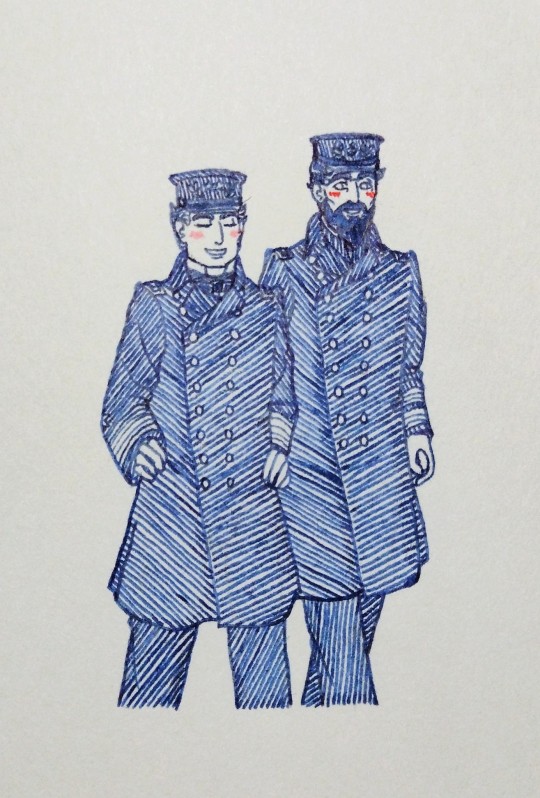
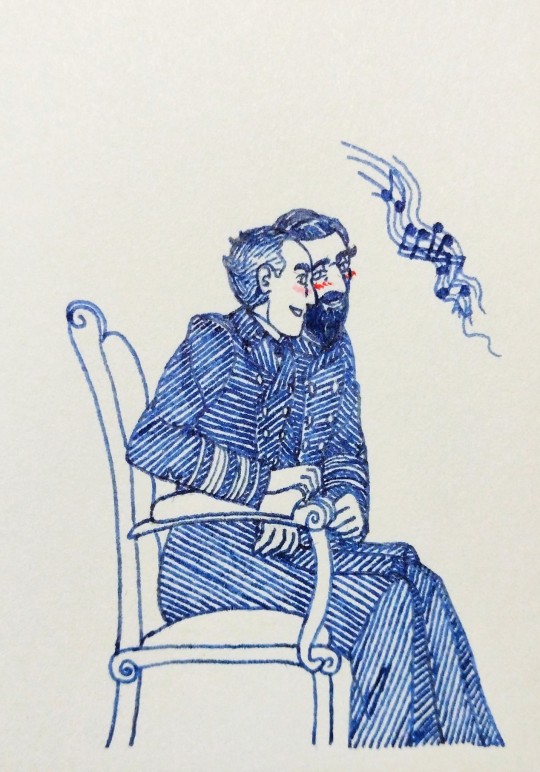
#oh to watch an opera recital in NOLA in early 1864...#drawing#original art#manga#illustration#pen and ink#traditional art#fountain pen#fan art#david glasgow farragut#david farragut#percival drayton#sketch
10 notes
·
View notes
Text

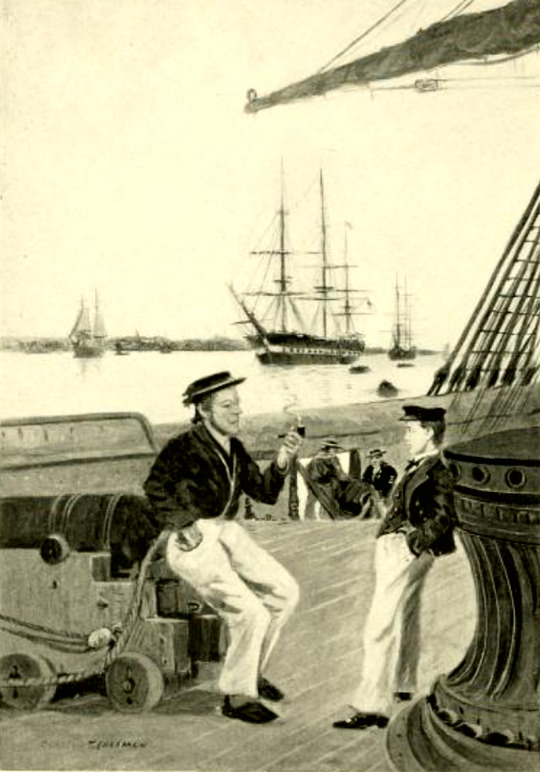
Illustrations by Carlton T. Chapman and others for Midshipman Farragut, an 1896 book for children recounting the life of United States Navy Admiral David Farragut. As a boy, Farragut was a young midshipman during the War of 1812. He also served in the Mexican-American War and the American Civil War, fighting for the United States against the Confederacy.
It was during the American Civil War that Farragut uttered the famous quote, "Damn the torpedoes, Full speed ahead!"
Late in the month of June a small squadron of American vessels of war lay at anchor in the harbor of New York—the President, a forty-four-gun frigate; the Essex, thirty-two guns; and the Hornet of eighteen.
Midshipman Farragut had once more joined his ship, and on this fine June day he was looking out through the gangway at the busy shipping and watching the shore boats shuttling back and forth. The air was filled with the creaking of block and tackle.
— Midshipman Farragut, by James Barnes.
#midshipman monday#david farragut#midshipman farragut#war of 1812#american civil war#us navy#naval history#age of sail#age of steam#military history#united states navy#us history#damn the torpedoes
28 notes
·
View notes
Text
was looking for a specific photo but instead i found this photo of an assignment from my us history 1 class where we had to make fake tweets about the american revolution...
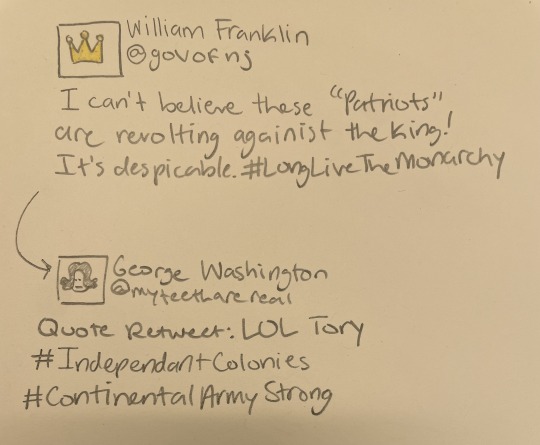
id: a drawing of fake tweets. the first is by William Franklin, whose username reads govofnj. his icon is of a crown. the tweet reads "I can't believe these "Patriots" are revolting against the King! It's despicable. #LongLiveTheMonarchy." there is a reply by George Washington, whose username reads myteetharereal. his icon is of himself. the tweet reads "Quote Retweet: LOL Tory. #IndependentColonies #ContinentalArmyStrong". end id
#i was going to say this may have been the funniest assignment i did for that class but.#of course theres the bill of rights playlist & the david farragut scrapbook....!#musings#history#<- sure.
15 notes
·
View notes
Text
happy appomattox anniversary! your friendly reminder that the confederacy sucked shit in every aspect of existence and the only positive of its existence is that it polarized the united states into passing the 13th amendment.
#appomattox#history#fuck the confederacy#also your reminder that the confederacy wasn't even necessarily “all southerners”#excellent general George Thomas basically evaporated confederate forces west of the Appalachians under cringefail dipshit Hood#top tier admiral David Farragut led the US navy in several key engagements that deprived the confederacy of their most key ports#and the guy who literally wrote the plan to beat the south was Winfield Scott a virginian
2 notes
·
View notes
Text
Admirals Farragut and Nimitz
Here’s Professor Craig Symonds at the 2023 Lincoln Forum in Gettysburg, PA, giving an excellent presentation comparing Admiral David G. Farragut and Admiral Chester Nimitz, pointing out leadership concepts and how character plays a role in leadership.
The video’s description reads, “Historian Craig Symonds talked about the similarities and differences in leadership between Civil War Admiral…
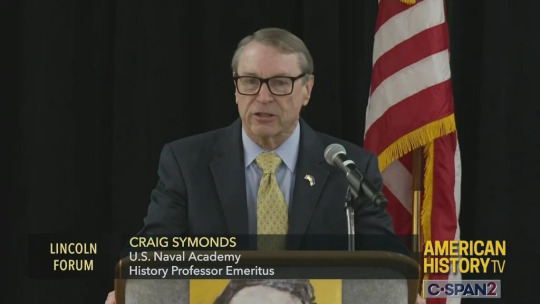
View On WordPress
0 notes
Text
The Courageous Southerners Who Became Union Commanders
Continue reading Untitled
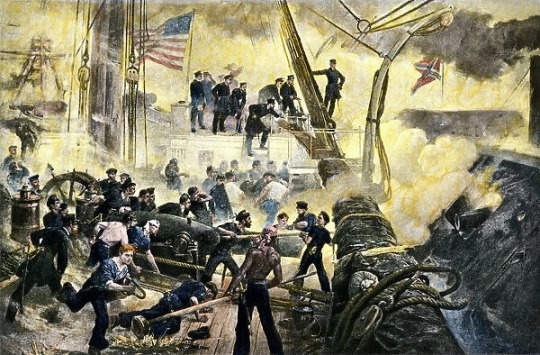
View On WordPress
1 note
·
View note
Text
Jim Kirk: sees four thousand people massacred as a young teenager
Jim Kirk: loses two hundred crewmates on the Farragut and blames himself for 11 years
Jim Kirk: almost dies dozens of times and tries to sacrifice himself for others
David Marcus, an asshole: the thing about you is that you've never faced death
682 notes
·
View notes
Text
Star Trek TOS crew biographies
There are plenty of detailed biographies of the TOS crew, both online and in reference books. But I wanted to check what actually appears in the Original Series and the six TOS movies about this subject (that is, not counting secondary sources or later series).
And the result is... very little, actually. I was surprised by the amount of data that I took for granted, just to find out it came from a novel or wasn't 100% set in stone.
This is what I could find about each major character, just judging from the TOS series and movies. Feel free to add to this or correct mistakes.
James Tiberius Kirk:
Although in the series he's referred just as James T. Kirk, his middle name "Tiberius" appears in Star Trek VI. "Tiberius" was also his middle name in TAS episode Bem, and the novel The Galactic Whirlpool (both by Gerrold), as well as in Roddenberry's TMP novelization. So yeah, no doubts about his name.
He was born in Iowa (Star Trek IV) and had one brother, George Samuel Kirk, and three nephews (What are little girls made of?). Sam married a woman named Aurelan (Operation: Annihilate).
Kirk was 34 in The Deadly Years. Assuming each season is a year of the five year mission, he could be 33 at the start of the series. And this is the only reference for his age I could find.
As for actual dates, I didn't find anything, except his statement in Star Trek IV that he comes from the late 23rd century.
(It wouldn't be until Voyager episode Q2, that a date was given for the end of the five-year mission: 2270. This follows Michael Okuda's Star Trek Chronology, and all other dates for TOS are inferred from this).
At age 13 he witnessed the massacre of Tarsus IV (Kodos was governor twenty years ago, in The Conscience of the King).
At age 18 he had just entered the Academy and was tormented by Finnegan. At this time he also met Ruth (fifteen years before Shore Leave).
He served in the USS Republic as an ensign, at some unspecified time after his Academy years, where he reported Ben Finney for negligency (Court Martial).
At age 21 he visited the planet Neural and befriended Tyree (thirteen years before A private little war).
He teached at the Academy as a lieutenant. One of his students was his friend Gary Mitchell (Where No Man has Gone Before).
He was a lieutenant in the USS Farragut at age 23 (eleven years before Obsession), where he first encountered the cloud creature that massacred his crewmates.
Kirk had a relationship with Areel Shaw when he was 29 (four years before Court Martial).
He became captain of the USS Enterprise after Pike. If we suppose TOS first season happens during the first year of the five-year mission, Kirk was around 37 at the end of this mission.
There's a big gap of fifteen years between Space Seed and the second movie. And apart from the five-year mission, most of those years are unaccounted for. Kirk's been an admiral for two years and a half at the start of TMP. But we don't know if he became an admiral right after the Enterprise's mission, or much later. That is, we don't know at what point of that gap take place the events of TMP.
Around this time, both Spock and McCoy had retired from Starfleet, though they both returned when Kirk took the Enterprise again for the V'Ger incident.
By The Wrath of Kahn, Kirk should be 48 years old (fifteen years since he left Kahn stranded in Space Seed). If David is around 30, Kirk's relationship with Carol could have been at the Academy, but it's also possible that David is younger.
The third and fourth films happen shortly after The Wrath of Kahn, but no idea how much time elapsed since then and the fifth and sixth films (though see the info for McCoy).
Spock
Known simply as "Spock". His full name is considered unpronounceable for humans, though the novel Ishmael gives it as "S'chn T'gai Spock".
His parents are Sarek and Amanda (Journey to Babel). Amanda's last name was never given, though TAS episode Yesteryear, some novels, and the 2009 reboot film establishes it as "Grayson".
Spock also has a half-brother: Sybok (Star Trek V).
I couldn't find anything about Spock's actual age during the series/movies.
He was betrothed to T'Pring at age seven (Amok Time).
He probably joined Starfleet eighteen years before Journey to Babel, since that's the time he spent not speaking with Sarek. If he joined Starfleet at 18 years old, he'd be 36 by season two (but that's just a supposition).
He was part of Pike's crew thirteen years before The Menagerie, during the events in Talos IV. He'd be 22 by then. Spock served under Pike for eleven years (also from The Menagerie). That means Kirk had been captain of the Enterprise for at least two years before season one.
After that, Spock's career runs more or less in parallel with Kirk's, so I won't go over it again.
Leonard H. McCoy
His middle initial first appears in Star Trek III, as well as the name of his father: David. The novel Provenance of Shadows explains the middle initial as "Horatio", but other novels call him "Leonard Edward McCoy" (???).
Much of his biographical background comes from the "Writer's Guide" by Roddenberry and Fontana, but never made it to the series. That includes the fact he's 45 (by season one?) and born in Georgia. As well as the fact that he's divorced and joined Starfleet as a result of this, and that he has a 20 year old daughter (Joanna).
Presumably, the story of his divorce and Joanna would have appeared in The Way to Eden, but the story was severely altered.
His daughter is mentioned, but without name, in TAS episode The Survivor, and in several novels. The Gold Key comics call her "Barbara" instead. His ex-wife is given different names in the novels and comics: Honey, Jocelyn, Joan, Gillian...
No idea when he joined Starfleet (that depends on how long was his marriage), or when he met Kirk.
Ten years before The Man Trap, he had a romance with Nancy Crater. Though in the episode he sometimes says he knew her twelve years ago, and other times ten years ago. Either it's a mistake, or the relationship simply lasted two years (though McCoy's doubts about Nancy remembering him, imply the relationship wasn't very long).
At some point, he visited Capella IV for a few months (Friday's Child).
He served in the Enterprise for 27 years (Star Trek VI), but only under Kirk, it seems. If he was 45 when he started, he'd be 72 in the last film, and Kirk would be 60 years old.
Note on McCoy's age in later series
The "Writer's Guide" statement that McCoy was 45 at the time of TOS, was contradicted by later series.
In TNG episode Encounter at Farpoint, he's said to be 137 years old. While in the episode The Neutral Zone (also from TNG season one) the year is 2364. As both episodes probably happen in the same year, McCoy would have been born in 2227.
Since, according to Voyager, the five-year mission lasted from 2266 to 2270, McCoy would have been 39 at the start of the mission.
I'm following the Writer's Guide figure, however, because I consider this document more relevant for TOS itself. After all, many things that are facts in later series, aren't the same in TOS, and viceversa.
Also, considering that the age of the characters seems to be close to the age of the actors, I find more likely that McCoy was 45, and not 39, at the start of TOS. To give you an idea, Shatner was 36 in season two (Kirk was 34), Nimoy was also 36 (just as Spock) and Kelley was 47. The twelve year gap between Kirk and McCoy, would be almost the same as the eleven year gap between Shatner and Kelley.
Montgomery Scott
Very little about him, but at least we got his full name in the series. He's supposed to be Scottish, and has lived in Aberdeen (Wolf in the Fold).
Apart from being Chief Engineer in the Enterprise, he was engineer advisor in a freighter, running from Deneva to the asteroid belt (Operation: Annihilate).
Uhura
We never knew her first name in TOS! This is one of the things that surprised me the most.
However, "Nyota" is her first name in the reboot films, the new series, and well before that, the novel The Entropy Effect.
She was probably born in east Africa, since her native language seems to be Swahili (the language she reverted to when her memory was wiped in The Changeling). Thanks to user @sapsuckers-and-stardust for pointing this out.
Very, very little about her bio background. Most of it has to be collected from novels or comics, and those never intended to be coherent with each other.
Hikaru Sulu
Though his first name was unknown for a long time, it was revealed to be "Hikaru" in Star Trek VI. But before this, he was also called Hikaru in The Entropy Effect.
Sulu was born in San Francisco (Star Trek IV).
Again, almost nothing of his bio in the series/movies. Though the DC comics explored his character significantly. And in Star Trek: Generations, he had a daughter, Demora.
By Star Trek VI, he was finally a captain of his own ship, the Excelsior.
Pavel Andreievich Chekov
His full name appears first in The Way to Eden, where we also learn he had a romance with Irina Galliulin at the Academy.
Chekov has no siblings (Day of the Dove).
He's 22 by season two (Who mourns for Adonais?).
After serving in the Enterprise, he was first officer in the USS Reliant during The Wrath of Kahn, though he returned with Kirk after the Reliant's destruction.
Christine Chapel
She abandoned her career in bio-research to sign aboard the Enterprise as a nurse, and search after her fiancé Roger Korby (What are little girls made of?) Strangely enough, a few episodes before, she had confessed her love for Spock. She chose to stay in the ship after finding out Korby was dead.
By the time of TMP, she was a doctor in the Enterprise, though she doesn't appear as part of the crew in the later movies.
Janice Rand
She served as a yeoman in the Enterprise during the early five-year mission, but disappears from the series afterwards.
In TMP, she's the transporter chief. And in Star Trek IV, Janice is seen at Starfleet Command, along with Chapel.
By Star Trek VI, she was the communications officer of the Excelsior, under Sulu.
#star trek tos#reference#biographies#star trek tos crew#james kirk#spock#leonard mccoy#uhura#montgomery scott#hikaru sulu#pavel chekov#christine chapel#janice rand
129 notes
·
View notes
Text
Bloodbath - Lucien Lachance

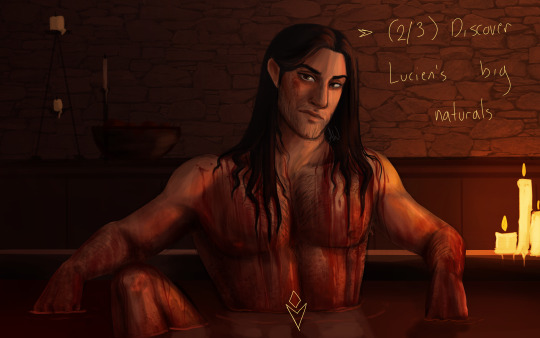
Quest Updated
Welcome to Fort Farragut
THIS WAS A LOT TO DO, I KEPT WORKING ON IT AFTER WORK AND ITS TAKEN LIKE 6-7ISH HOURS (and bless David Revoy for making the dryad brush pack on Krita, that soft pastel brush saved my life), pure pain but wow I am proud for my first really ambitious piece in a while. Uh it's by no means perfect but i like it a lot
Either way, as promised?? Lucien in that Geralt of Rivia inspired bath scene. I was originally going to use this to announce chapter 3 but i was way too pumped after getting this to a place where I felt satisfied. So here we are?
I hope yall like it
apfel
#lucien#lucien lachance#fanart#tesblr#dark brotherhood#suggestive#tes 4 oblivion#digital drawing#kritadrawing
358 notes
·
View notes
Text
Carol breaking up with Kirk and telling him to stay away from their child - part is Kirk, part is his job
Janet breaking up with Kirk and marrying someone else - part is him, part is his job
La'an telling Kirk she moved on - the connection is still there, she doesn't think she will ever stop having feelings for James Kirk, but she now knows that there are other people she can be her real self with, who see her, and she'd rather not pursue anything of a romantic nature with him - our jobs wouldn't permit it (she might serve as his first officer on the Farragut though, for more angst and lost chances; but she won't transfer with him back to the Enterprise. Una told her that even though she regretted never pursuing her feelings for Pike, she wouldn't change it because she could always be there for Pike, always be by his side, doing a job she loved)
(but also obviously them getting/wanting to get together and La'an dying is always a choice as well - from Kirk's POV this makes sense, from La'an's I don't want this...)
and Kirk just closing his heart off and dedicating himself to his job completely, stopping to want to form a relationship, which he thought he could have before, but apparently not
Love. You're better off without it, and I'm better off without mine. This vessel, I give, she takes. She won't permit me my life. I've got to live hers.
And he envies his brother because he could do that. He could have a family and a job he loved.
And then he encounters Khan Noonien-Singh (I'm using a dash because SNW!Khan should have a dash). He knows his legacy is genocide, torture, but also La'an - a woman he will always hold dear to his heart. The logical path would be to let the Starfleet know about Khan and let them deal with him, but instead, he gave him a chance to live. He found him a planet and didn't inform Starfleet that Khan Noonien-Singh was back. Because of La'an.
And then Khan is back. And his return reunites him with Carol and his son. And while he hadn't thought of her for years, the memories of La'an hit him with strength again. He rejected her for a life he thought he could have with Carol and their son. And his son is now a young man who doesn't know him, who hates him, and would like to see him dead. Because Carol asked him to stay away.
"If there are self-made purgatories, then we all have to live in them"
And Khan wants to kill him. Kirk wanted to give him a second chance but because he hadn't informed anyone, no one checked on the planet where Khan was sent to and never learned that the surface became almost inhabitable.
Khan wants to kill him and doesn't care how many other people die with Kirk. And Spock sacrifices himself so the Enterprise can be saved. And his death allows him and David to connect.
And maybe now Kirk could get to know his son. Maybe after all those years, he could finally get something he wanted. Spock's death hurt but it gave Kirk a new chance.
But then David is killed and Kirk never truly recovers from his son's death.
(at least he realizes he has a family with McCoy and Spock, but it can't fill the void of his son and a romantic partner)
"...I was like you once ...so completely blinded by duty and obligations that I couldn't see anything past this uniform. And in the end, what did it get me? An empty house..."
---
yeah, anyway, just putting La'an into my typical Kirk journey
#you can't have a noonien-singh without marcuses#it's all connected and interwoven#i really hope they will do much more with it#i had to include janet because... it's janet#like i won't go the cliché way that is his feelings toward la'an took him away from his son and khan brought his son back into kirk's life#but it'd be funny#this is very rough because i just wanted to write it down before i forgot#snw nonsense#tos nonsense#headcanon times#jim kirk#star trek tos#star trek snw#la’an noonien singh#carol marcus#david marcus#khan noonien singh
35 notes
·
View notes
Text
I have lots to say about S07E23 Preventative Medicine but my document was swelling with analysis of this one line from Hawkeye, and I want to write a whole post about it for a very particular reason.
I've often expressed my frustration at the show being wishy-washy with its anti-army messaging in the later years or not doing right by the Hawkeye character by either softening his opposition to the army or making him say straight up OOC shit. And I've talked broadly about the show doing the same thing in general, saying stuff that I think is OOC for MASH - it's hard to give specific examples because they're so numerous and dispersed.
So when I stumbled upon this one example of I think, very good characterization of Hawkeye that is particularly rich yet distilled nicely in a single line of his dialogue and then masterfully camouflaged by the show's tone and Alan Alda's comedic acting chops, I wanted to point it out. I realized, this- this is why I get so cagey about the poor, inconsistent writing on the show in the later years, because when it is good, it is so fucking good. And Hawkeye is so, so, so fucking good:
Hawkeye: Colonel, you left out a lot of good stuff. What about "Into the Valley of Death" or "Remember the Alamo" or the ever-popular "Damn the Torpedos!"
Lacey: Doctor, why do you just take care of these brave men?
Hawkeye: "I have not yet begun to fight!"
Just before this, BJ does call Lacey's speech "disgusting" which is gutsy, for BJ. I have to say "for BJ" because to be fair to him, anyone will have a hard time looking gutsy next to Hawkeye (with the exception of Klinger, more on that someday)
Anyway, Hawkeye elevates it from the obvious and situates Lacey’s actions within a broader system of military incompetence leading to senseless death. He makes no less than four historical references:
“Into the Valley of death” From Alfred Tennyson’s poem about the Crimean War, which similarly glorifies the high death toll rather than condemns it. Important to note that Tennyson’s poem is in the same spirit as Lacey’s speech and both Hawkeye and the writers of this episode know that. An aside regarding the poem: Because I am so continually gutted and angered by any positive framing and re-framing of Rudyard Kipling, in the world, but particularly in this fandom, I will be the first to point out that Kipling later wrote “The Last of the Light Brigade” in conversation with Tennyson’s poem. It's not that difficult to find out. Yes, Kipling's "transformative" poem is about the hardships faced by veterans (a departure from Tennyson's poem) and no I don’t think that’s enough to see past Kipling’s extraordinary racism and white-supremacist artistic accompaniment to the brutality of British Colonialism waged upon my ancestors and millions of other people's ancestors - the effects of which are still felt deeply to this day by us as individuals, our communities and are imbued in the systems that oppress us. That should always be at the forefront of Rudyard Kipling's legacy, regardless of context.
“Remember the Alamo” - a similar “last stand” often framed and re-framed as being a brave sacrifice. A favourite war story of the American canon.
“Damn the Torpedos!” you don’t have to live like a refugehhh both Hawkeye and Tom Petty & the Heartbreakers are referencing a quote attributed to US Navy commander, Admiral David Farragut, although it’s doubtful he actually said it, the meaning of the quote remains: charge forward even if you’re likely to die in your attempt. Farragut was a decorated career army man who fought in multiple wars and after his death in the late 1800s became a mascot for the US Navy and his likeness was used on WWI and WWII propaganda posters, urging citizens to sign up. I think Hawkeye and the writers are aware of this too.
After Lacey tries to remind Dr. Pierce MD that he is in fact a doctor not a soldier (cries in the Hawkeye Pierce complex) Hawkeye exclaims “I’ve not yet begun to fight!" – that’s John Paul Jones during the American Revolution while appearing to have lost a battle at sea with the British. He succeeded, but it's worth noting that the ship he was in command of, the Bonhomme Richard, sustained such damage, it sunk.
That is a lot for barely 20 seconds of dialogue.
Hawkeye being anti-army isn’t just broadly true of him. It’s packed very densely into these kinds of lines (of which I'm sure there are many) and then dressed up in theatrics. Alan Alda hams it up here and I love it, because it highlights how vapid and fake military propaganda and nationalist refrains are.
If you’re not familiar with the references he’s making and the analysis of them that I've laid out here/other facts associated with them, then they might just land as a “haha, Hawkeye is such a funny guy” perhaps with some vague awareness that he doesn’t like Lacey.
It's very hard for me to accept anything less from this show, and from Hawkeye in particular, when you have examples of how concentrated and deep his rage and passion runs.
46 notes
·
View notes
Text
...who's this pipsqueak?? 🐣👀🌊
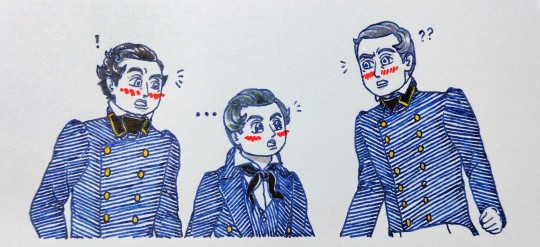
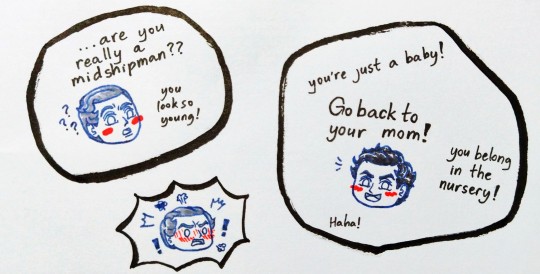
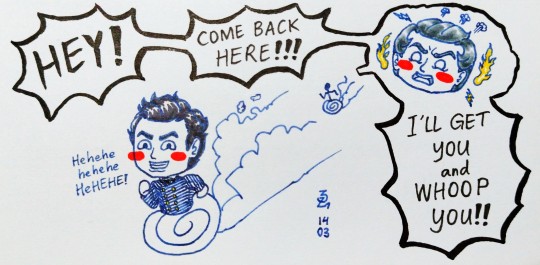
...yeah, still with uniting the middies together 😏🤭😂
#the most important thing you gotta know is...#glasgow's feisty as hell#...and that started very early(!) in his life 😏😌🔥#drawing#original art#manga#pen and ink#traditional art#fountain pen#brush pen#fan art#comic strip#samuel phillips lee#david farragut#david glasgow farragut#john dahlgren#john a dahlgren#american history#sort of
6 notes
·
View notes
Text
@shades-of-tiefes-purpur 💖♥️💖 thank you my love for the tag, I always appreciate! Yesterday and today was rough so that’s why I’m late to reply…
Header: Silver Strand Beach 💚✨

Icon: Right now it’s just a photo of me in black and white
Description: currently it’s “Simona ❁ Is é Ruairí grá mo chroí ❤︎ ❤︎ ❤︎
I’ve cried enough tears to fill up an ocean, Surely you see that my world’s been broken”
-> my first name, Irish Gaelic for “Rory is the love of my heart” , and lyrics from Rory Gallagher’s Edged in Blue from album Calling Card (1976), one of my all time favourite songs ♥️.
Content: This blog is ancient, but I only started using it in 2020 and then it was a Queen (band) account primarily. Now it is a classic rock, blues, western/cowboys, nature and whatever else collection of things I love, I’m always on about my favourite things…
Background colour: Forest Green, one of my favourite colours along with sea blue
URL meaning: death-by-mercury, it’s my original url and I don’t plan on changing it. It originally was referring to Freddie Mercury (hence mercury), and really I just think it sounds cool. But it’s kind of funny if you think of it literally… death by (Freddie) Mercury… it’s supposed to sound kind of like “death by chocolate” or something I donno.
Blog Title meaning: “Damn the Torpedoes, Full Speed Ahead” I am referring to the 1943 movie, “The More, The Merrier” in which Mr Dingle repeats the line throughout the movie, although the quote is originally by Admiral David Glasgow Farragut… so there’s that, it’s a good movie, I recommend it :))
Full movie is on YouTube: https://youtu.be/NzvjYjVDHIY
->if you fast forward to 5:12 in the movie you can hear him saying rhe quote
youtube
Tagging @jonesyjonesyjonesy
@beanifred @m00ndingochan @shamanbluesss @thegroovywitch @greyhound-locker @greensleeves2107 @milkyway-ashes @blunderbussin @childoftheriver @clinteastwood-blog @d3adite @dustywoolhat
5 notes
·
View notes
Note
Re the Civil War (my special interest in Jr high!) : why idolize Lee, who "CoUlDn'T bEtRaY hIs HoMe StAtE" when David Farragut, who was from the South and lived in Virginia at the beginning of the war, is right there-- because he stayed with the Union, he had to give up everything he had, move his wife and son to NY basically under the cover of night, was seen with suspicion at first since he was a Southerner, and parts of his family never talked to him again. Infinitely more heroic.
I just recently read a good biography of Lee (Robert E Lee: A Life) which paints a more accurate picture of Lee that includes his flaws. In a paper I called Lee "the most forgiven figure of the Civil War" and I'll stand by that. We need to stop looking at him with rose colored glasses.
-Reid
49 notes
·
View notes
Text
Review: Wild at Heart (1990)
Wild at Heart (1990)
Rated R

<Originally posted at https://kevinsreviewcatalogue.blogspot.com/2023/05/review-wild-at-heart-1990.html>
Score: 5 out of 5
Wild at Heart is a quintessential David Lynch movie, a film that's not as weird as his reputation suggests but gets treated as such anyway (including by Popcorn Frights, who hosted a screening this past Friday night) because he often uses a lot of stylish camera tricks and goes for a very offbeat tone. The "non-linear storytelling" is really just a very liberal use of flashbacks, and beneath the stylization, the story is very coherent, even if it doesn't hit the beats you'd normally expect. What it is, rather, is a film that carries the substance one would normally expect from Lynch, a melancholy exploration of Americana as our protagonists take a long road trip across the South that evokes a dark subversion of The Wizard of Oz. It's the kind of movie where you can immediately understand why a musician like Lana Del Rey seemingly built her entire persona around Lynch's films, as I found myself immediately drawn in by its modern-day Southern gothic atmosphere, its captivating lead performances by Nicolas Cage and Laura Dern, and the mounting sense of dread as two seemingly star-crossed lovers take a long road trip and encounter a number of increasingly weird characters along the way. I've heard that it's divisive, regarded as either one of Lynch's best films or one of his worst with not a whole lot of middle ground between them, but as somebody for whom this was his introduction to Lynch's films, I can say that I'm certainly intrigued, and eager to seek out his other movies.
The film opens in Cape Fear, North Carolina with one of our two protagonists, Sailor Ripley, getting targeted for murder by Marietta Fortune, the wealthy, snobbish mother of his girlfriend Lula, only for him to brutally beat the assassin she hired to death in front of a large crowd at a fancy party. Two years later, with Sailor out on parole (the court judged that, while excessive, he was acting in self-defense), he and Lula immediately hook up again, much to the horror of her mother, who sees him as a sleazeball who's corrupting her daughter (and also wanted him for herself). Thus begins a long road trip as Sailor and Lula drive west in a vintage Ford Thunderbird, breaking parole, while unbeknownst to them, Marietta hires the private detective (and her on-and-off boyfriend) Johnny Farragut to retrieve Lula -- and also hires the vicious gangster Marcello Santos to outright kill Sailor.
The plot of the film is largely in Marietta's side of the story, but the actual meat of the film concerns Sailor and Lula, a pair of young lovebirds on the run. Everybody involved with the film has described them as two halves of one character, and that is how they function, a young couple deeply in love who won't let the disapproval of Lula's mother get in the way of that love. While Nicolas Cage does get one of his famous freakouts at the start of the film, for most of it he's channeling Elvis Presley and James Dean, and not just because he's in a T-Bird and sings the King's romantic songs to Lula; from his accent to his snakeskin jacket, he projects an image of '50s cool that even the film itself admits is kind of a put-on, but it's one that he makes work. Laura Dern, meanwhile, was both beautiful and challenging as Lula, the rebellious daughter of an aristocratic Southern belle who's seen up-close the hypocrisy and hidden horrors of her upbringing that you're not supposed to talk about in polite company. And together, I fully bought their love story. Not only was it hot as hell (fair warning: there's a lot of sex in this movie), the two characters at the center were compelling thanks to Cage and Dern's performances, such that I wanted to see them together and quickly came to despise Willem Dafoe's character in his brief but instantly despicable role. In real life, you know that a relationship like theirs shouldn't work, but on the screen here, it did anyway. The ending of this film was a difficult one that could've easily turned corny, but it felt earned.
The supporting characters, too, were outstanding and prevented the film from just becoming a meandering mess, the big one being Diane Ladd as Lula's mother Marietta. We're shown early on that Marietta wanted Sailor for herself, the implication being that she's jealous of her daughter's relationship with him and has decided that, if she can't have him, no one can. Further revelations of her past with Sailor only drive home just how disturbed she actually is, especially her history with J. E. Freeman's Santos and Harry Dean Stanton's Farragut, the men she sends after Sailor and Lula, and how Sailor's life intersected with hers in the past. Willem Dafoe, meanwhile, is only in the film briefly, but his character Bobby Peru immediately steals the show once Sailor and Lula meet him in a small town in Texas, an absolute scumbag of a criminal whose entire time on screen is spent doing, planning for, or implying terrible things. The whole movie is filled with the kinds of little characters who you might encounter in these kinds of small towns, as well as minor figures in the characters' lives, played by a host of character actors like Crispin Glover, Sherilyn Fenn, and Isabella Rossellini. "It's about the journey, not the destination" is a cliché, but it absolutely applies here: I felt like I was on a road trip with Sailor and Lula as they journeyed across America, blissfully unaware of Marietta's goons coming for them.
Lynch, for his part, does a great job of capturing that dreamlike feel on the screen. His American South is a land of lonely roads, rock music, and interesting sights that you might not experience anywhere else. The brief plot detour involving the people who crashed on the side of the highway, for instance, may not have had any real plot purpose, but it did a lot of work building up that sense of dread as you began to suspect that Sailor and Lula's journey was not going to end well for them. It was stylish without feeling stylized, a film that made great use of the rural South from the forests back east to the dust of West Texas, and it got me in the feeling of taking a long journey to nowhere in particular, reminding me of some of the sights I saw last year driving from Florida to Utah.
The Bottom Line
It's a hard movie to describe, and it's not for everyone, but I absolutely adored Wild at Heart. I'm now eager to seek out the rest of David Lynch's filmography thanks to this beautiful, captivating dark romance, a film where even the few flaws I could come up with felt like they were put in there for deliberate effect. Check it out.
#wild at heart#1990#crime movies#crime#thriller#romance#road movie#david lynch#nicolas cage#laura dern#willem dafoe#crispin glover#isabella rossellini#diane ladd#harry dean stanton
2 notes
·
View notes
Text
i finished the david farragut scrapbook btw ..... i shall maybe post it later
2 notes
·
View notes